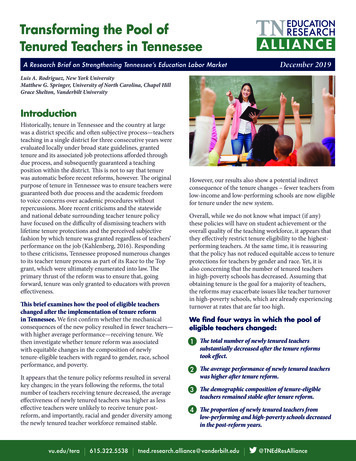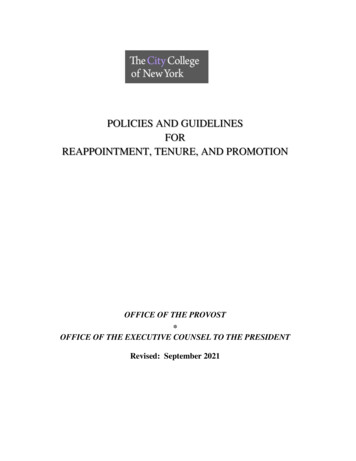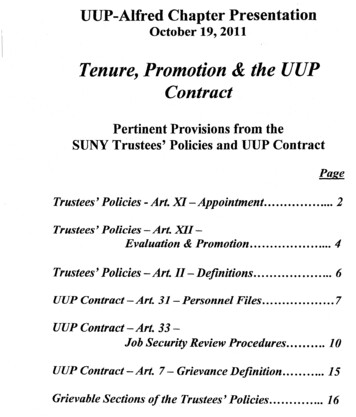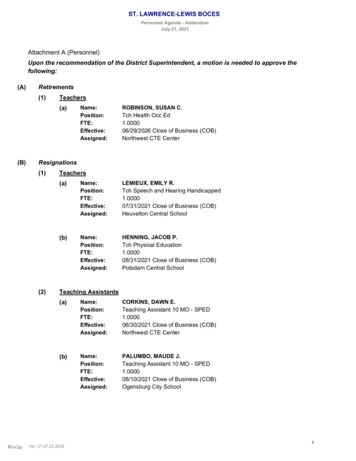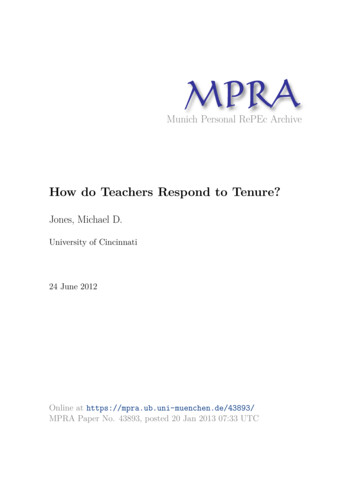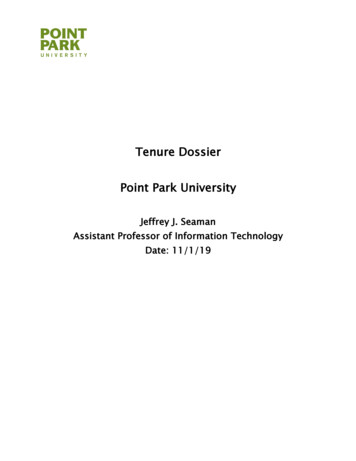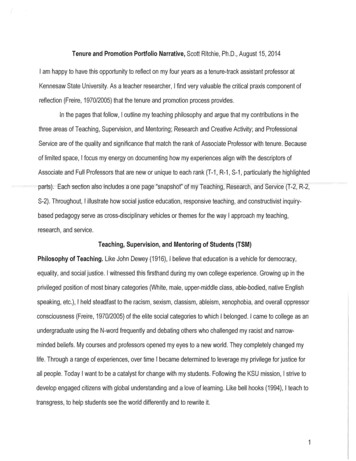
Transcription
Tenure and Promotion Portfolio Narrative, Scott Ritchie, Ph.D., August 15, 2014I am happy to have this opportunity to reflect on my four years as a tenure-track assistant professor atKennesaw State University. As a teacher researcher, I find very valuable the critical praxis component ofreflection (Freire, 1970/2005) that the tenure and promotion process provides.In the pages that follow, I outline my teaching philosophy and argue that my contributions in thethree areas of Teaching, Supervision, and Mentoring; Research and Creative Activity; and ProfessionalService are of the quality and significance that match the rank of Associate Professor with tenure. Becauseof limited space, I focus my energy on documenting how my experiences align with the descriptors ofAssociate and Full Professors that are new or unique to each rank (T-1, R-1, 5-1, particularly the highlightedparts). Each section also includes a one page "snapshot" of my Teaching, Research, and Service (1-2, R-2,S-2). Throughout, I illustrate how social justice education, responsive teaching, and constructivist inquirybased pedagogy serve as cross-disciplinary vehicles or themes for the way I approach my teaching,research, and service.Teaching, Supervision, and Mentoring of Students (TSM)Philosophy of Teaching. Like John Dewey (1916), I believe that education is a vehicle for democracy,equality, and social justice. I witnessed this firsthand during my own college experience. Growing up in theprivileged position of most binary categories (White, male, upper-middle class, able-bodied, native Englishspeaking, etc.), I held steadfast to the racism, sexism, classism, ableism, xenophobia, and overall oppressorconsciousness (Freire, 1970/2005) of the elite social categories to which I belonged. I came to college as anundergraduate using the N-word frequently and debating others who challenged my racist and narrowminded beliefs. My courses and professors opened my eyes to a new world. They completely changed mylife. Through a range of experiences, over time I became determined to leverage my privilege for justice forall people. Today I want to be a catalyst for change with my students. Following the KSU mission, I strive todevelop engaged citizens with global understanding and a love of learning. Like bell hooks (1994), I teach totransgress, to help students see the world differently and to rewrite it.
As a social justice educator, I know through my 20 years experience teaching in various capacitiesand through my research with other social justice educators across the U.S. (Ritchie, 2013) that in order tohelp students push their thinking toward sociocultural and sociopolitical understandings of the world, one'steaching must be responsive to students' needs, and a great deal of care must take place in building a senseof community. I try to get to know my students, listen to them, and respond to their evolving educationalneeds. Finally, like Paulo Freire (2004), I believe that we are all in a state of becoming in which we arecurious about the world. As I have refined my teaching philosophy, I increasingly feel my role as a teacher isto tap into this curiosity, this inquisitiveness, and help students, through inquiry, discover their own passionsand their own agency to change the world to make it a better place. By getting to know one's students,making teaching culturally responsive, and being knowledgeable and passionate about the content matter, ateacher's students are able to take more risks and learn more content that challenges the status quo. Ratherthan having students simply regurgitate information, my goal as an educator is to produce students who thinkcritically, innovate, and ultimately change the world to make it more just, democratic, and humane.Experiences with Teaching, Supervision, and MentoringSince coming to KSU, I have taught 14 courses in four different programs (EECE, EDRD, EDRS, andGWST) across two colleges (BCOE and CHSS) (vitae; T-2). This range has provided me with muchopportunity to engage in pedagogical experimentation, assess instructional effectiveness through studentfeedback and self-reflection, and improve my techniques for working with students, accomplishments thataddress encouragement I was given in my third year review to continually improve my teaching.My students have remarked about my pedagogical experimentation, saying I am "unafraid of tryingdifferent ways of executing content for the course," and "Dr. Ritchie adjusted content and assignments asneeded throughout the course, so he was continually improving as we went" (T-3). In addition to being veryknowledgeable, my undergraduates have commented about how I create an atmosphere that is flexible andresponsive to their needs, that I am personable, and take their lives into consideration (T-4).Being responsive allows me to experiment and update my approaches for working with students aseffective facilitators of learning. Students appreciate how I ask for their feedback and model inquiry in a way2
that helps them teach the inquiry process to their own students. They comment on how "he made us all feelhe cared about each of us" and how, even in my classes with very strict class participation policies andheavy reading loads, it was the first time many of them read the entire textbook. Seeking feedback forimproving my teaching helps me pare down my lessons to what is most beneficial: 'All the activities we didwere very beneficial and I feel like they served a purpose for our education. None of it was 'busy work" (T-5).While I came to KSU with some organizational tools and skills, I used student feedback to becomemore organized and thorough in my expectations, have high expectations while also providing feedback thatis both positive and constructive (T-6), establish clear and concise goals with no surprises, make contentrelevant and meaningful, and use new technologies (T-7). Despite having a heavy workload, my studentscommented on how the required readings benefited them and that the classwork and my knowledge ofgraduate students helped them learn (T-8). When I got behind on grading one semester while experiencing adivorce, my students were not afraid to mention it in evaluations but were also very understanding and stillcommented on how they "loved" the course, learned a lot, and were challenged to think differently (1-9).In my first doctoral class, even though we read and discussed issues of racism, xenophobia, andcritical theory, the students responded very positively, saying the articles were thought-provoking and that myresponsive teaching made the course meaningful for them. These data are supported by my dissertationresearch: many teachers feel they have had limited exposure to sociocultural and sociopolitical explanationsfor problems such as hunger, poverty, homelessness, etc., and yearn for new ways of thinking about theworld that will open their minds. Additionally, in my two sections of doctoral directed readings, when onesection of two doctoral students used extremely deficit-oriented discourse to talk about children and families("People on welfare are just stupid! They're stupid!"), I had us regroup, engage in on-the-fly experimentation,and read the book, Is everyone really equal? An introduction to key concepts in social justice education,which I am sure challenged their beliefs but seemed to open them up more to issues of equality, democracy,and justice. Their course evaluation suggested I "gave purposeful assignments" and was "supportive" (T-10).In another doctoral class in which we read and discussed a range of critical theories that called intoquestion the homophobic and deficit-oriented remarks I heard during class discussions, students reported
that the course "challenged me more than any other class I have taken at KSU," while giving gave stellarreviews. In a different course, one student in particular was very upset and angry about the readings, sayingstudying racism, multiculturalism, and LGBTQ topics had no place in our college classroom. These ideascame through clearly on the course evaluation, but that they "should in no way cast negative light on Dr.Ritchie." The other parts of the evaluation indicated that my responsiveness, flexibility, and caring approachoutweighed the challenging content matter. Finally, in my most recent GWST course with undergraduates, inspite of some controversial material about sexuality and gender identity, students made comments indicatingthe class was thought provoking, broadened their perspective, and challenged them to think in new ways (T11). I can say with confidence that I have sharpened my teaching, especially since my last review.A powerful mechanism I use in my teaching to obtain formative assessment data is the use ofmidpoint checks. Around the halfway point each semester, I give students an anonymous, informalassignment to tell me how things are going (T-12). This midpoint check serves as an incredibly valuable tool;one that I have used in every class and will continue to use because it allows me to make immediateadjustments and improvements to the class to meet students' needs and improve student learning.One of the responsibilities of a full professor that I have had the fortune to take on is modelinginstructional leadership. I have been invited to guest lecture in different capacities: as a content expert onFreire's teaching in ECE 9250, culturally responsive pedagogy and multicultural education in EDUC 2120and INED 4430, social justice education in ECE 4404, and effective writing pedagogy through teaching in theKennesaw Mountain Writing Project Summer institute. One of the online courses I developed, EDRD 7715,has also served as an instructional model for other instructors (T-13).Often, we don't hear enough praise from students. I have received unsolicited emails from studentssuggesting that (a) the course I taught was one of the best of a student's graduate career, (b) that myfeedback and encouragement helped prevent a student from dropping out of her specialist program (she hasnow gone on to pursue a doctorate, as well), and (c) that I had the most impact of any professor on aparticular student, so she wanted me to be her dissertation chair (T-14). Additionally, on two separate4
occasions, students named me as making a difference in their lives when surveyed by Career Services (T15), and one student designated me for special recognition at the University Scholars ceremony (T-16).Finally, an Associate Professor "develops new courses, course materials, and other pedagogicalinnovations"."that incorporate their own research" (Full Professor) (EECE T&P Guidelines; T-1), I havehad experience developing new courses and course material in several capacities since coming to KSU andincorporating my research. Working with Patti Bullock, I helped lead a team of other faculty interested inteaching a themed methods cohort called "Social Justice TOSS" (Teaching of Specific Subjects). For thisthemed cohort, I redesigned the ECE 4404 course syllabus around my research on critical literacy and socialjustice education and marketed the cohort around four themes identified in my dissertation research (T-17).This work would ultimately lead to a refereed publication, international conference presentation, and twoexternal grants. Additionally, I served on a cross-departmental and cross-college team that designed fournew graduate programs in Curriculum & Instruction (certificate, MEd., Ed.S,, and Ed.D.). During this processI designed the syllabus for a new course, "Equitable Decision Making for Middle & Secondary Education" thatincorporated my research on equity and social justice (T-18). In my own department, I led a team of sixfaculty in developing two new entire degree programs, an Ed.S. and Ed.D. in Early Childhood Education,during which I developed three courses, ECE 8180, 9100, and 9150 (T-19). I developed two new courses forGender and Women's Studies, GWST 3070 and 3080, into online and hybrid versions (T-20). Finally, Ideveloped new qualitative research modules for EDL 7900 (T-21). These examples demonstrate my crossdisciplinary work in course and program development that incorporates my research.Research and Creative ActivitySince my last review, I have made great progress in research and creative activity. Department guidelines forRCA appear in (R-1). A snapshot of my work in RCA appears in (R-2). My Third Year reviewers encouragedmore refereed publications, presentations, and external funding, which I address in this section. Additionally,I name each publication and presentation within the narrative.Publications. In this section, after each publication, I include in parentheses statistics (when available) aswell as in print-outs after each publication on how many times the publication has been viewed (V) and how5
many times it has been downloaded (0) from my own personal pages on Academia,edu and ResearchGateto show some measure of impact.In 2012 I published a solo-authored article, Incubating and sustaining: How teacher networks enableand support social justice education," in the Journal of Teacher Education (R-3). The high quality of the workis demonstrated by the rigorous review process through which it underwent in a top-tier journal with anacceptance rate of 6% (V 189; D 38). It is significant because one of my colleagues, Dr. Sohyun An,nominated this article for the KSU Foundation Prize for Publication, and it was named a finalist for theuniversity prize (R-4). Further, several faculty in INED and SMGE have shared with me how they assign it intheir courses. In 2013 I published an invited article on culturally relevant pedagogy for their newsletter,What's the IDEA?, My article, titled, Reclaiming sociopolitical critique within culturally relevant pedagogy,"appeared as the headlining piece in the Spring 2013 issue of the newsletter (R-5). This piece was highquality because it underwent editorial review and represented scholarship based on my dissertationresearch. It is significant because it led to a conference presentation at the Sources of Urban EducationalExcellence conference (V 128; 0 38).In response to a call for papers, I invited Neporcha Cone, Sohyun An, and Patti Bullock to co-authora manuscript about our Social Justice TOSS experiences. Our article, "Teacher education for social change:Transforming a content methods block," was published in Current Issues in Comparative Education in 2013(R-6). This work is high quality because it underwent rigorous peer-review in a highly-esteemed internationaljournal (V234; D 101). it is significant because it represents the culmination of a cross-disciplinarycollaborative research project. Furthermore, as a result of this article's publication, I was invited to apply forand was awarded two grants from the Open Society Foundations, and the four of us were invited to submit aconference proposal for an international conference. Moreover, we found the article was significant to others,as well, when a faculty member in elementary education at UGA told us her department was reading ourarticle as inspiration (R-7). "Teaching for social justice in three voices," a solo-authored article, was publishedin the Journal of Critical Thought and Praxis in the winter of 2013/2014 (R-8). This work is high qualitybecause it went through peer review in a national journal. It is significant not only because it demonstratesN.
my involvement in research but also because I use the themes generated from this research in mycoursework (1-17), in my conference presentations, and in collaborative work I do in schools and withgraduate students (V160; 0 6).A book chapter in the form of an encyclopedia entry has been fully accepted and is in press. It isscheduled to be released this fall. My publication, "Egocentrism in self and society," will appear in theEncyclopedia of Diversify and Social Justice (R-9). This work generating book chapters is high qualitybecause it went through editorial review and significant because it draws upon my work teaching andresearching ECE 9100 Cognitive Processes and Educational Practice. Finally, a poem I wrote called"Sensitivity" (R-10) that I have performed at numerous spoken word venues has been submitted and is underreview at literary journal, The Southern Tablet. This work, if published, is high quality because it will havegone through editorial review, and it is significant because it integrates my work in masculinity studies withchildhood and adolescent development.Additionally, I am currently working on drafts of three manuscripts, including one from mydissertation research, "Radicalizing events and mentors: Key influences on teaching for social justice" (R-1 1),as well as an article with my doctoral student Whitney Spooner, titled, "Exploring disability with first graders"(R-12) and another co-authored manuscript with my former GRA Dudgrick Bevins based on our study oftransgender children's literature, titled "Disrupting Genderism in Schools: A Critical Analysis of TransgenderTrade Books (R-13). Further, I am including in Binder 3 four publications from my time before I came to KSUincluding: "Culturally relevant pedagogy for science education," "Coaches coaching coaches," and two booksreviews: my review of the book Literacy as a civil right: Reclaiming social justice in literacy teaching andlearning and my review of the book Literacy Assessment & Intervention for K-6 Classrooms (2nd ed.) (R-14).These prior publications demonstrate some of the strands that run through my research and teaching:culturally relevant pedagogy, literacy for social justice, and Freirean teacher education. An overall snapshotof my research from research website aggregators such as Google Scholar appear in (R-15).Presentations. The Assistant Professor RCA criteria state that Assistants "[pjresent at local and state juriedconferences at professional societies or organizations" (EECE T&P Departmental Guidelines). My record7
clearly shows I am exceeding in this category, with only one regional juried presentation since I have been atKSU, while the rest were international (N 1 1) and national (N 8) (see R-1).In 2010, I presented "Walking the talk: How eight P-12 educators came to teach critically" at GlobalConversations in Literacy Research (R-16). In this seminar, I disseminated to an international audienceresults from my research with teachers across the United States who enact social justice pedagogies. I havepresented four research sessions at the Literacies for All Summer Institute of the National Council ofTeachers of English put on by the International Whole Language Umbrella, In 2011, I presented "Criticalliteracies, critical inquiry, and community: Three case studies," which showcased three case studies ofteachers I interviewed during my dissertation research (R-17). This session was one of 10 sessions featuredin the conference preview. In 2012, I co-presented two sessions with four of my doctoral students at KSU.Wendy Harris, Karen Kraeger, Tiffany Proctor, and I presented "Co-constructing spaces for student agency:Critical discourse analysis in K-8 settings," which highlighted the discourse analysis work these studentsconducted in our ECE 8120 class (R-17) and was showcased by NCTE with the "Bell Ringer" honor, I alsoco-presented "Critical literacy with first graders: Reclaiming joy through inquiry, collaboration, and action"with doctoral student Whitney Spooner, whose dissertation I am chairing. We disseminated our collaborativeresearch conducted in her Cobb County classroom. I have included photos from these two sessions in (R17). In 2013, again I brought a KSU student to co-present with me, my former graduate research assistantDudgrick Bevins with whom I conducted research on transgender representations in children's literature. Oursession was titled "Transgressing transphobia: How teachers can support gender variant students in the ELAclassroom" (R-17). These examples demonstrate my work at the Full Professor level in presenting atinternational juried conferences and conducting cross-disciplinary research projects that integrate myteaching, research, and service on social justice education, critical literacy, inquiry, and gender studies.Since 2010, I have presented at the National Council of Teachers of English annual convention threetimes. In 2010 I presented "Walking the talk: What we can learn from critical educators" that disseminatedfindings from my research with social justice educators (R-18). In 2012, I presented a session on"Negotiating critical literacy in the middle grades: Interrogating stereotypes with Latino students" in which I
shared my research on culturally relevant critical literacy education. In 2013, I presented "Using historical andpersonal narratives to address issues of race, ethnicity, and religion" that disseminated results from myinterviews with teachers as well as my classroom research with preservice teachers around social justiceeducation (R-18). In November, I will present "Never too young for fairness: Using LGBTQ themed literaturewith elementary children" that integrates my cross-disciplinary research on literacy and gender and sexualitystudies. Additionally, I presented for the first time last year (2013) two presentations at the Literacy ResearchAssociation: "Disrupting genderism in schools: A critical analysis of transgender trade books," and "Teacheridentity and agency in a critical literacies course" (R-19).I have presented three sessions at the annual meeting of the American Educational ResearchAssociation, education's premier research association. In 2012, I presented an international session,"Incubating and sustaining: How radicalizing networks support teacher education for social justice" (R-20). In2013, I presented "Teaching for social justice in three voices" (R-20), And in 2014, I co-presented a crossdisciplinary Arts Based Educational Research pre-conference session, "Beyond the masks" with fivecolleagues from KSU (R-20). Additionally, there are three conferences I have presented at one time. In 2014,I co-presented with Dudgrick Bevins, "Disrupting genderism in schools: A critical analysis of transgendertrade books" at the JoLLE@UGA national conference (R-21). Also in 2014, I co-presented with NeporchaCone and Sohyun An (Patti Bullock could not participate) an international session, "Teacher education forsocial change" at the Conference of Comparative and International Education (R-22). In 2014 I co-presentedalong with Sohyun An, Corrie Davis, Jillian Ford, Paula Guerra, Leena Her, Patty McHatton, and Joe Norris,"Beyond the masks: A participatory performance exploring issues of inclusion/exclusion in schools andbeyond" at the International Congress of Qualitative Inquiry (R-23). Finally, in November, I will present aninternational session at the National Women's Studies Association annual conference, "Not born in the wrongbody: How cisnormativity lies and elides" based on my cross-disciplinary research in gender, queer studies,and children's literature (R-24). Overall, these national and international presentations at premierprofessional associations demonstrate high quality, significant work. The ways in which I integrate myteaching, research, and service around similar themes shows a clear research agenda and strengthens the
impact of my work. Besides peer-reviewed work, my teaching, scholarship, service to schools, and activismhave attracted invitations to present and conduct workshops. In (R-25) I include programs, thank you letters,and photos of several invited presentations that are listed in full detail on my vitae.Finally, my research and scholarship has been honored on two separate occasions at KSU. First, theEECE Research and Scholarship Committee honored me on the cover page of its inaugural newsletter,Research & Scholarship Review, in a faculty spotlight (R-26). Second, GWST started a "Faculty Focus"scholars program at its monthly meetings in January 2012, and I was invited to be its first scholar (R-27).Grants. As my vitae and RCA Snapshot (R-2) show, I have applied for a total of 42,687 and have receivedapproximately 24,750 since arriving at KSU, 6,200 of which is from external foundations, The number ofexternal grants since my third year review, when it was suggested I apply for external funds, has increased200%. I am currently in contact with Dierdre Williams from Open Society Foundations about additionalexternal grant opportunities and have an internal award under review, as well (R-28).Professional ServiceAlthough service is not a focus area on my FPA/ARD, my record shows I am exceeding in this area, basedon Associate and Full Professor criteria (5-1). A snapshot of my service appears in (S-2). Since this is not afocus area, I will elaborate in less detail and will refer reviewers to my vitae and binder as evidence.Department. Lists of all departmental standing committees show that I am/was a member of Research andScholarship, MEd. Applicant Review, Ed.S./Ed.D Applicant Review (currently chair), and the DFC (S-3). Inaddition, I have served on an Elementary Literacy Search Committee, as a multi-year evaluator of MEd.Conferences, as M/Ed. Cohort Coordinator for two years (S-4), and on a faculty learning community (FLC)for literacy. I took a leadership role in my department when I was named departmental Coordinator ofEd.S./Ed.D. Programs. During my tenure in this role, I successfully led a team of six faculty in developing twoentire advanced degree programs from start to finish using a backward design process. We started withperformance outcomes (standards), developed assessments, and then mapped existing courses and wrotenew courses to align with the standards and assessments (S-5). These programs went through TEC, GPCC,and the BOR and started enrolling Summer 2013. In addition, I recruited and led nine faculty to develop all10
existing face-to-face EdS. and Ed.D. classes into additional fully-online versions to provide more coursedelivery options to students. Our programs will go fully online in Summer 2015.College. I serve on the Candidate Advisory Council and have served on an SMGE Literacy SearchCommittee, the TQP Elementary Student Learning Team, a team of reviewers of GRA proposals, as aneditorial reviewer for a colleague, and a member of the Parliament of Owls faculty writing group (S-6).EPP. I serve on the Advanced Program Coordinators (APC), EPP Ed.S./Ed.D. Steering Committee,Research Task Force (I am one of only 4-5 full-time faculty SACS qualified to teach qualitative researchmethods), and served formerly as a member of the Ed.S./Ed.D. Design Team, the Curriculum and InstructionDesign Team, and an EPP-wide FLC on "Creating Safe Schools for GLBTQIQ K-16 Learners" (S-7).University. I have been serving on the Institutional Review Board, Presidential Commission on GLBTIQInitiatives, as a campus-wide QM Peer Reviewer, and an active member of Gender & Women's Studies (seedetailed letter from Coordinator Laura Davis on my role there). I also have served as a teacher in theKennesaw Mountain Writing Project and as a mentor to the KSU Student Safe Space program (S-8).Hopefully the connection is clear between my teaching of social justice and gender topics, my research, andmy service/activism, but to give one particular example of how all three integrate, in 2013 I received an emailfrom a colleague at GSU concerned about Cobb County School District's code of conduct for studentteachers (CCSD is where we place the most education students) (S-9). I felt that the language of the policywas unfair to any non-heterosexual teachers because it forbade discussion of one's sexual orientation, whichoften de facto means one's romantic partners, Surely heterosexual teachers would not stop talking abouttheir husbands, wives, boyfriends, and girlfriends because of this policy; it was clearly aimed at preventingdiscussion of sexual practices. I contacted Anete Vasquez in CEPP and the GLBTIQ Commission, and wedrafted more inclusive language that was eventually adopted by the school district for student teachers (S-9).Professional Associations. I serve on the Editorial Review Board of Language Arts journal, NCTE'selementary journal. I also conduct reviews for Action in Teacher Education and Talking Points, I serve on theExecutive Board of the Center for Expansion of Language and Thinking (CELT), a small nonprofit consultinggroup of many of the world's finest literacy scholars. I have served in various leadership roles through the
American Educational Research Association special interest group, Critical Educators for Social Justice,most recently on their executive board as Communications Co-Chair in charge of designing a newsletter,designing/maintaining a webpage, running a listserv, and updating a Facebook page, I was also in charge ofthe annual Graduate Student Forum mentoring session at AERA (S-1 0). As the documents in this sectionalso show, I have served as a conference proposal reviewer for AERA and as a discussion leader for NCTE.Schools. As mentioned before, I served on a TQP Elementary School Student Learning Team that met inschools, I took a leadership role as facilitator of a Critical Friends Group protocol that helped academiccoaches, administrators, and teacher more closely examine student work to improve instruction. InDecember 2012 I co-facilitated a session for coaches and in the spring I mentored coaches and teachers asthey used the protocol. Additionally, I co-researched and co-taught with first grade teacher Whitney Spoonerwhen her students decided to take action to help students with disabilities (S-I 1).The community. I interned for a year with community organization Men Stopping Violence to learn waysmen can make communities safer for women and girls. Through this work, I brought MSV to campus forGender Focus Week and have since started a partnership between MSV and KSU
Kennesaw State University. As a teacher researcher, I find very valuable the critical praxis component of reflection (Freire, 1970/2005) that the tenure and promotion process provides. In the pages that follow, I outline my teaching philosophy and argue that my contributions in the
